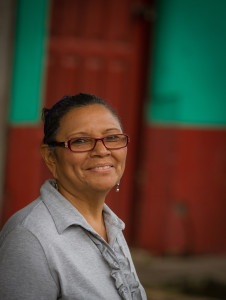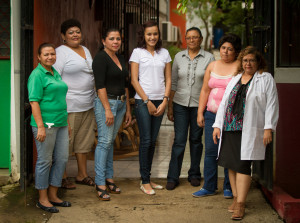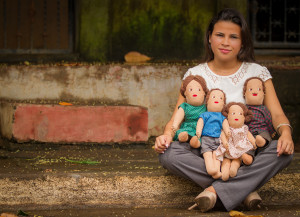Name: Norma Villalta Age: 61
Role: Administrator of Acahualt Women’s Center
Q: How did you first learn about the Acahault and how long ago?
A: We founded the organization in the 90s. We (Norma Villalta and Maria Elena Bonilla) founded it due to the needs we saw in our community such as the deaths of many women. We also saw that a lot of women and their children suffered abuse inside the nuclear family. This led to the creation of our first project to investigate the large numbers of deaths of women–which turned out to be cervical cancer–and then to offer them support.
Q: What have you learned from participating in this organization?
A: We learned that with solidarity and organizing, we could analyze the context in which we lived. This is the only way to achieve our goals to help each other as women. It was helpful to get to know each other and to analyze how peace and tranquility can be achieved by defending our human rights. Respecting ourselves for others to respect our decisions, body, and mind –and this is how we were able to develop ourselves in life.
Q: Could you describe an ideal activity in your day as an example of your work?
A: When we sit to brainstorm problems and we see the strengths, weaknesses, opportunities and threats–the development of the first outline of our work and the first project we set out to do.
Q: Can you tell us about an important thing you have done while working for the organization that has been lodged in your memory?
A: When we had our first campaign for the prevention of cervical cancer. This activity allowed us to reach out to many sectors, saving the lives of many women who were diagnosed early.
Q: How would you picture the organization in 10 to 20 years?
A: We would like to see the organization here in 20 years with the human and economic resources needed to provide holistic services to women who are in need in so many of the communities; an organization committed to defending women’s rights.
Q: What is the biggest obstacle for the organization?
A: Lack of economic resources to cover the salaries and maintenance of our infrastructure.
Q: What are the biggest needs that the organization has right now?
A: Our most pressing needs include supporting youth, adolescents and women in general, finding the funds for salaries, maintaining the infrastructure, and maintaining our basic services offered.
Q: Have you had a spiritual experience which you would like to share?
A: Quaker House has brought people who work with spirituality. We have participated in these events. We have developed and gained knowledge of our origins, the afterlife, and Earth as a journey in which we can learn and develop spiritually before returning to God.
Q: What is an example of work the organization does for peace and justice?
A: We empowered ourselves through the Alternatives to Violence workshops with the facilitators from ProNica, and then we led the workshops with various groups.
Q: What advice would you give someone who wants to make a change in the world?
A: To work for the change in human behavior for equality, peace, justice and the love of God.
By Ada Lopez, ProNica Co-Program Director




